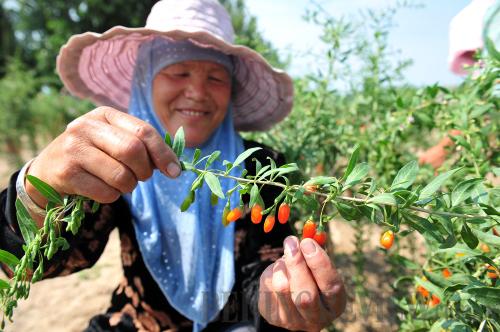|
 |
|
SWEET FRUIT: A farmer picks wolfberries, or goji berries, in Helan County, Ningxia Hui Autonomous Region. Northwest China's Ningxia has a long history of planting wolfberry trees and the plant has become a pillar industry in the region, with its output exceeding 5 billion yuan ($800 million) (PENG ZHAOZHI) |
Declining Confidence
Chinese entrepreneurs, bankers and residents have become less optimistic about the country's economic conditions, central bank data revealed on June 25.
The entrepreneurs' confidence index came in at 64.9 percent in the second quarter, retreating 2.1 percentage points from the previous quarter, the central bank said in a report, citing results from a survey of over 5,900 Chinese entrepreneurs.
In a separate report based on a survey of 3,100 bankers, the central bank said their second-quarter confidence index was down 13.9 percentage points from the previous quarter to 53.7 percent.
The surveys found that more people are concerned about employment. Of the 20,000 savers the central bank surveyed, 43.8 percent considered employment conditions "harsh" or "murky," and their expectation index was 47.8 percent, down 2.1 percentage points from a quarter earlier.
Home prices are still a major issue of public concern, with 63 percent of people surveyed describing prices as "high and hard to accept," down 1.3 percentage points from the previous quarter.
Some 50.3 percent reported that they expect home prices to remain unchanged in the third quarter, while 21.2 percent predicted rises.
The changing outlook came as China's property sector continued to cool in May, as new home prices in half of a sample of 70 major cities showed month-on-month drops.
Fiscal Pressure
China may struggle to meet this year's fiscal revenue target, the finance minister warned on June 24.
The central treasury received 2.9 trillion yuan ($472 billion) from January to May, a year-on-year growth of 6.3 percent, 0.7 percentage points lower than the budgeted target, said Lou Jiwei, when briefing lawmakers on the final accounts for 2013.
This year's budgeted growth of central fiscal revenue is 7 percent. The government is "under heavy pressure," Lou said.
Difficulties lie in the downward pressure on the economy and the program to replace business tax with value-added tax (VAT) in some service sectors, which will reduce tax revenue by some degree, Lou said.
A Net Investor
China's outward foreign direct investment (FDI) is very likely to exceed its inward FDI in 2014, making the country a net investor, according to the United Nations Conference on Trade and Development (UNCTAD).
In 2013, China's inward FDI rose by 2.3 percent to $123.9 billion, ranking second in the world after the United States, according to the UNCTAD's World Investment Report released on June 24.
"What's more, China's outward investment is more striking," said Zhan Xiaoning, Director of the Investment and Enterprise Division at UNCTAD.
In 2013, investment outflows from China increased by 15 percent to $101 billion, the third highest in the world after the United States and Japan, the report said.
As China continues to deregulate outbound investment, outflows to developed and developing countries are expected to grow further, it said.
Outward investment will serve as an important driver for industrial upgrading and economic growth, Zhan said.
RRR Review
The central bank is considering an annual review system to decide whether to cut lenders' reserve requirement ratio (RRR), China Securities Journal reported on June 25.
Reviews will focus on whether or not a bank's lending to small and micro-sized enterprises and the agricultural sector has met requirements set by the central bank. The central bank has been encouraging lending to those areas—long neglected by banks in China because of higher risk.
Banks that meet the standards will have lower reserve ratios, the newspaper said, citing an anonymous source. A lower RRR gives a bank more funds to lend and the chance to make more profits.
The central bank started cutting RRRs selectively this year, as part of its effort to allow greater monetary flexibility while maintaining a prudent monetary policy amid an economic slowdown.
| 